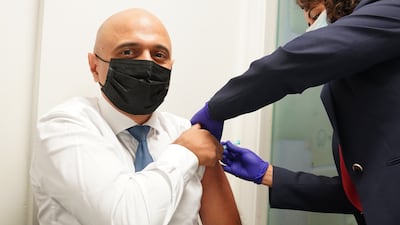Live updates: follow the latest news on Covid-19 variant Omicron
About 132 million coronavirus shots were given last year amid the largest vaccine campaign in British history.
More than 90 per cent of people in the UK over the age of 12 have now had their first dose of a Covid-19 vaccine and 82.4 per cent have had their second.
The emergence of the Omicron variant pushed authorities to expand vaccination efforts over the festive season and more than 1.6 million people received their booster dose in the final week of 2021.
This brought the total UK number of boosted adults to 34 million, including three in four eligible adults in England.
Health Secretary Sajid Javid thanked NHS staff and tens of thousands of volunteers for the success of the programme since December 2020, and urged more people to get their booster in the new year.
“The Covid-19 pandemic has been one of the biggest challenges our health service has ever faced and our historic vaccination programme has been vital in helping us step up to meet this challenge,” he said.
Mr Javid added that “132 million vaccinations in a single year is astounding and a true reflection of the fantastic work of our NHS and its volunteers” and said: “I want to thank each and every one of them.
“But we need to make sure people continue to come forward for their life-saving jab.
“As we go into the New Year, make sure you ‘Get Boosted Now’ to kick off 2022 with the best possible protection from Omicron.”
Prime Minister Boris Johnson set the target of offering all eligible adults the chance to get their top-up shots by the end of January, but following the emergence of Omicron he brought forward the deadline to the start of the year.
Millions of Britons queued at about 3,000 vaccination centres. On December 18, NHS England administered a record 830,000 shots in a single day.
The acceleration of the programme was supported by 750 armed forces workers, and the government suspended the 15-minute observation period following Pfizer and Moderna boosters for most patients.
Vaccines minister Maggie Throup urged more adults to come forward in the new year, and described the distribution of doses as a source of national pride.
“The UK Covid-19 vaccination programme is something we can all be proud of – having provided tens of millions of people with protection from this deadly virus over the past year,” said Ms Throup.
Recent UK Health Security Agency data shows people who are unvaccinated are up to eight times more likely to be admitted to hospital than those who are fully vaccinated.
Coronavirus cases are continuing to rise across the world, and one in 25 people in England had the virus last week, according to ONS data. This figure increases to one in 15 in London.


























